Arts & Entertainment
Laughs a la ‘La Cage’
Dated but endearing musical charms with gay parenting tale
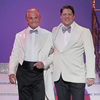
‘La Cage aux Folles’
Through Feb. 12
The Kennedy Center
$65 and up
202-467-4600
kennedy-center.org
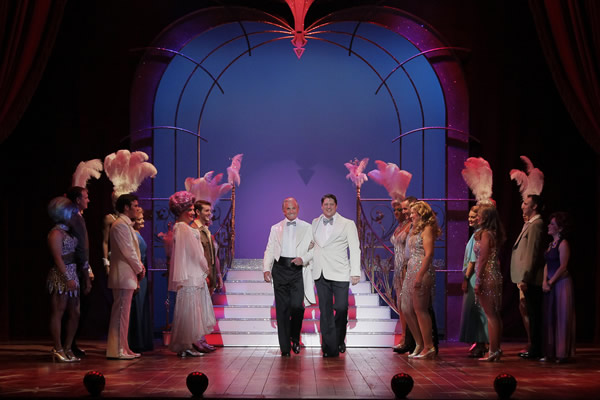
George Hamilton and Christopher Sieber, center, in ‘La Cage Aux Folles’ playing now at the Kennedy Center. (Photo by Paul Kolnik; courtesy Kennedy Center)
Sometimes smaller is better. Case in point: Terry Johnson’s Tony Award-winning revival of “La Cage aux Folles” now at the Kennedy Center. The Broadway director’s scaled-down take on the feel-good musical is a charmer. Far more enjoyable than previous, more lavishly produced versions.
Before the show begins, a sassy drag queen wearing a pastel suit and pillbox hat (a salute to first ladies of yesteryear) takes a seat on the edge of the stage and warms up the crowd. She jokes with those filing in, asking about birthdays and anniversaries. She advises the buttoned-up folks in the crowd to relax, then inquires if there are any Indian, black, or Jewish lesbians in the house. After her, the audience is ready for anything.
With a hummable score by Jerry Herman (gay) and big-hearted book by Harvey Fierstein (also gay),” La Cage” is an old fashioned musical about family. Georges (George Hamilton) owns a drag club on the Riviera where his longtime partner Albin (Christopher Sieber) performs as Zaza. Together they’ve raised Jean-Michel (Billy Harrigan Tighe), Georges’ son from a long ago night of experimentation with a less-than-maternal playmate. The action kicks off when their son unexpectedly returns home for a visit, followed soon after by his new fiancée and her right-wing politician father and cowed mother. Needless to say, much zaniness, hurt feelings, anger and sentiment ensues.
Sieber’s Zaza is a big-boned, glittery diva (looks like Tyne Daly rolled in sequins) who works the room (in this case the Eisenhower Theater) like a pro. Her old school act references Marilyn and Marlene. But Lynne Page’s incredible, acrobatic choreography is left to Zaza’s back-ups, the lovely Cagelles (Matt Anctil, Logan Keslar, Donald C. Shorter Jr., Mark Roland, Terry Lavell and Trevor Downey). However, make no mistake, despite the sexy showgirl getups (compliments of costume designer Matthew Wright) not one of these muscular chorus boys could be mistaken for a real lady. But that’s part of the fun. Johnson’s reimagined dancers are vastly more entertaining than the much longer, mixed kick line of biologically female chorines and passable lovelies seen in past productions.
Set designer Tim Shortall cleverly sets the scene with a palm-decorated, scallop-topped proscenium. His stage within a stage quickly transforms into Georges and Albin’s over-decorated flat above the club in which the backstage story plays out.
Buzz surrounding the national tour suggested that 72-year-old movie actor and jetsetter George Hamilton was a big disappointment as Georges. In fact, he’s quite endearing in the role of the indulgent father and loving spouse. With his fabled suntan and signature insouciance, he certainly fits the part of a San Tropez club owner. And while he isn’t much of a dancer, his singing isn’t bad.
As high maintenance-but-lovable Albin, Broadway musical veteran Siebert s is simply terrific. He’s a powerhouse performer who plumbs the part for big laughs but can also dial down his performance when needed. But Sieber is at his best when Albin’s personal life spills into alter ego Zaza’s drag act and he belts Herman’s gay anthem “I Am What I am” with heartfelt power.
Adapted from the same-titled French play, “La Cage Aux Folles” was a little racy when it premiered on Broadway in 1983. Whatever shock value the show once had is gone. Same-sex parents are a nightly news and sitcom staple. Still, the creaky plot cranks out laughs and its messages of self- acceptance and the importance of family whatever its composition still resound strongly.
Movies
‘Hedda’ brings queer visibility to Golden Globes
Tessa Thompson up for Best Actress for new take on Ibsen classic

The 83rd annual Golden Globes awards are set for Sunday (CBS, 8 p.m. EST). One of the many bright spots this awards season is “Hedda,” a unique LGBTQ version of the classic Henrik Ibsen story, “Hedda Gabler,” starring powerhouses Nina Hoss, Tessa Thompson and Imogen Poots. A modern reinterpretation of a timeless story, the film and its cast have already received several nominations this awards season, including a Globes nod for Best Actress for Thompson.
Writer/director Nia DaCosta was fascinated by Ibsen’s play and the enigmatic character of the deeply complex Hedda, who in the original, is stuck in a marriage she doesn’t want, and still is drawn to her former lover, Eilert.
But in DaCosta’s adaptation, there’s a fundamental difference: Eilert is being played by Hoss, and is now named Eileen.
“That name change adds this element of queerness to the story as well,” said DaCosta at a recent Golden Globes press event. “And although some people read the original play as Hedda being queer, which I find interesting, which I didn’t necessarily…it was a side effect in my movie that everyone was queer once I changed Eilert to a woman.”
She added: “But it still, for me, stayed true to the original because I was staying true to all the themes and the feelings and the sort of muckiness that I love so much about the original work.”
Thompson, who is bisexual, enjoyed playing this new version of Hedda, noting that the queer love storyline gave the film “a whole lot of knockoff effects.”
“But I think more than that, I think fundamentally something that it does is give Hedda a real foil. Another woman who’s in the world who’s making very different choices. And I think this is a film that wants to explore that piece more than Ibsen’s.”
DaCosta making it a queer story “made that kind of jump off the page and get under my skin in a way that felt really immediate,” Thompson acknowledged.
“It wants to explore sort of pathways to personhood and gaining sort of agency over one’s life. In the original piece, you have Hedda saying, ‘for once, I want to be in control of a man’s destiny,’” said Thompson.
“And I think in our piece, you see a woman struggling with trying to be in control of her own. And I thought that sort of mind, what is in the original material, but made it just, for me, make sense as a modern woman now.”
It is because of Hedda’s jealousy and envy of Eileen and her new girlfriend (Poots) that we see the character make impulsive moves.
“I think to a modern sensibility, the idea of a woman being quite jealous of another woman and acting out on that is really something that there’s not a lot of patience or grace for that in the world that we live in now,” said Thompson.
“Which I appreciate. But I do think there is something really generative. What I discovered with playing Hedda is, if it’s not left unchecked, there’s something very generative about feelings like envy and jealousy, because they point us in the direction of self. They help us understand the kind of lives that we want to live.”
Hoss actually played Hedda on stage in Berlin for several years previously.
“When I read the script, I was so surprised and mesmerized by what this decision did that there’s an Eileen instead of an Ejlert Lovborg,” said Hoss. “I was so drawn to this woman immediately.”
The deep love that is still there between Hedda and Eileen was immediately evident, as soon as the characters meet onscreen.
“If she is able to have this emotion with Eileen’s eyes, I think she isn’t yet because she doesn’t want to be vulnerable,” said Hoss. “So she doesn’t allow herself to feel that because then she could get hurt. And that’s something Eileen never got through to. So that’s the deep sadness within Eileen that she couldn’t make her feel the love, but at least these two when they meet, you feel like, ‘Oh my God, it’s not yet done with those two.’’’
Onscreen and offscreen, Thompson and Hoss loved working with each other.
“She did such great, strong choices…I looked at her transforming, which was somewhat mesmerizing, and she was really dangerous,” Hoss enthused. “It’s like when she was Hedda, I was a little bit like, but on the other hand, of course, fascinated. And that’s the thing that these humans have that are slightly dangerous. They’re also very fascinating.”
Hoss said that’s what drew Eileen to Hedda.
“I think both women want to change each other, but actually how they are is what attracts them to each other. And they’re very complimentary in that sense. So they would make up a great couple, I would believe. But the way they are right now, they’re just not good for each other. So in a way, that’s what we were talking about. I think we thought, ‘well, the background story must have been something like a chaotic, wonderful, just exploring for the first time, being in love, being out of society, doing something slightly dangerous, hidden, and then not so hidden because they would enter the Bohemian world where it was kind of okay to be queer and to celebrate yourself and to explore it.’”
But up to a certain point, because Eileen started working and was really after, ‘This is what I want to do. I want to publish, I want to become someone in the academic world,’” noted Hoss.
Poots has had her hands full playing Eileen’s love interest as she also starred in the complicated drama, “The Chronology of Water” (based on the memoir by Lydia Yuknavitch and directed by queer actress Kristen Stewart).
“Because the character in ‘Hedda’ is the only person in that triptych of women who’s acting on her impulses, despite the fact she’s incredibly, seemingly fragile, she’s the only one who has the ability to move through cowardice,” Poots acknowledged. “And that’s an interesting thing.”
Arts & Entertainment
2026 Most Eligible LGBTQ Singles nominations
We are looking for the most eligible LGBTQ singles in the Washington, D.C. region.

Are you or a friend looking to find a little love in 2026? We are looking for the most eligible LGBTQ singles in the Washington, D.C. region. Nominate you or your friends until January 23rd using the form below or by clicking HERE.
Our most eligible singles will be announced online in February. View our 2025 singles HERE.
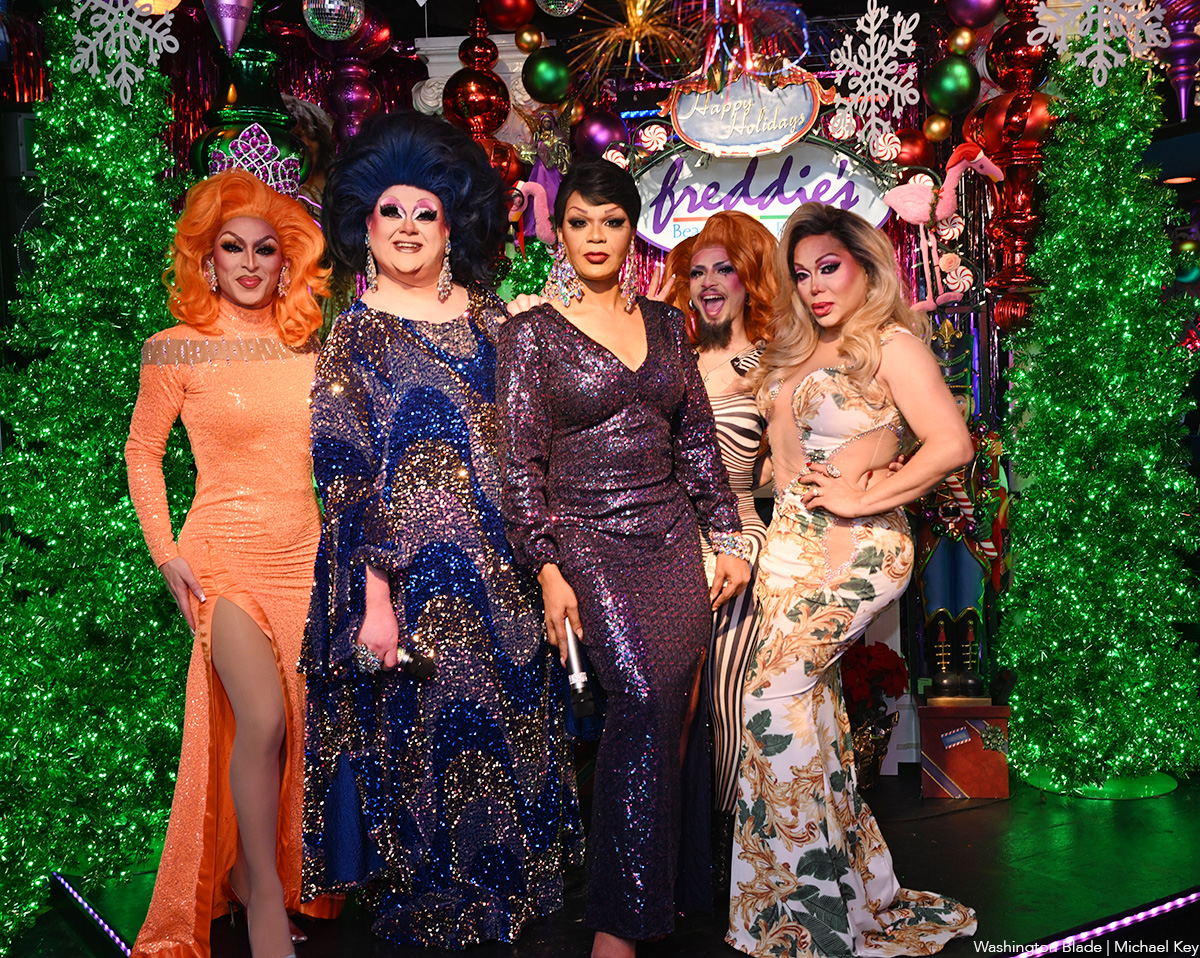
The Freddie’s Follies drag show was held at Freddie’s Beach Bar in Arlington, Va. on Saturday, Jan. 3. Performers included Monet Dupree, Michelle Livigne, Shirley Naytch, Gigi Paris Couture and Shenandoah.
(Washington Blade photos by Michael Key)

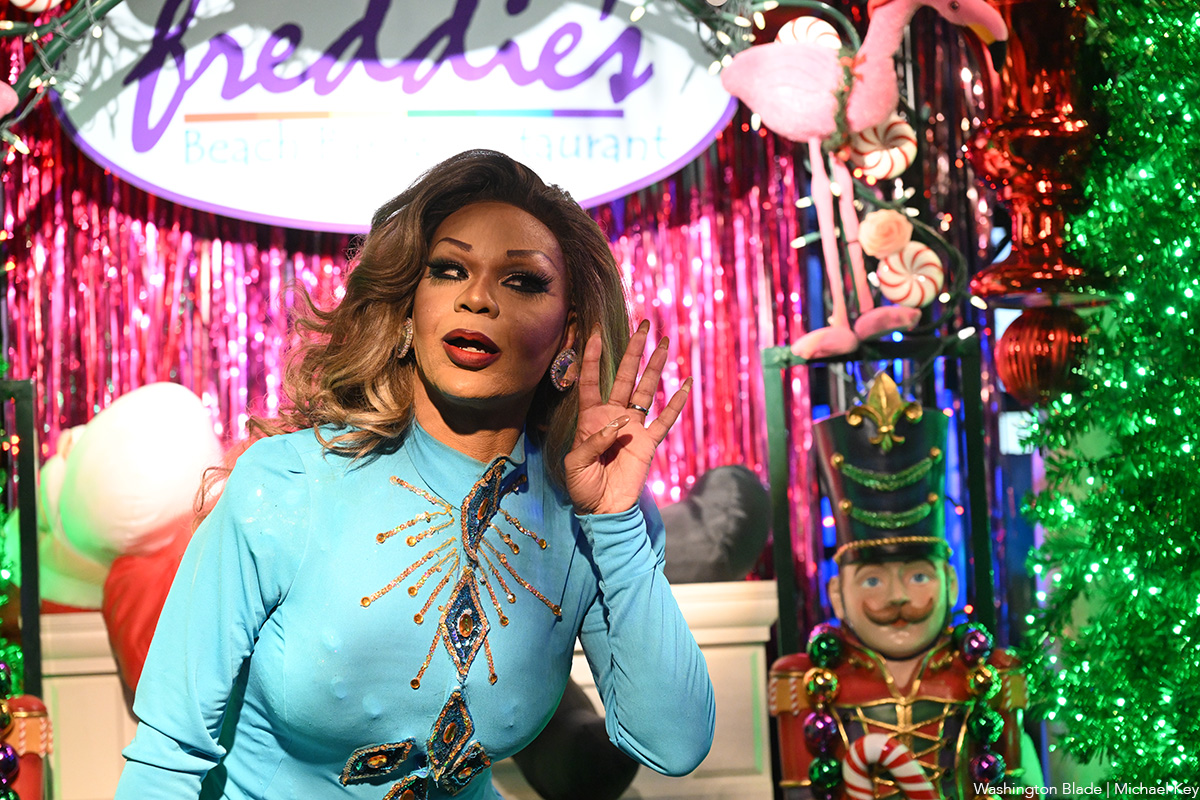





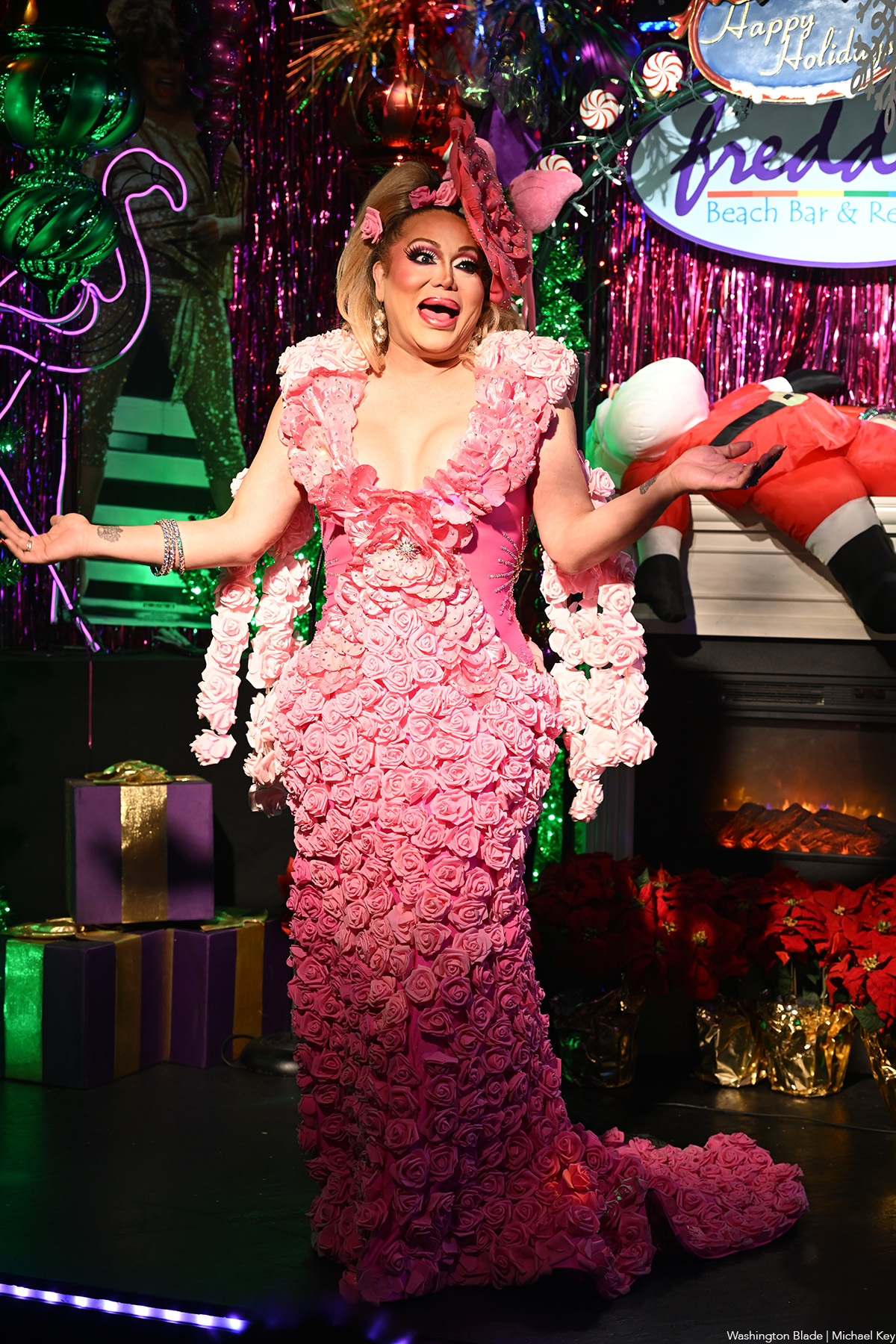
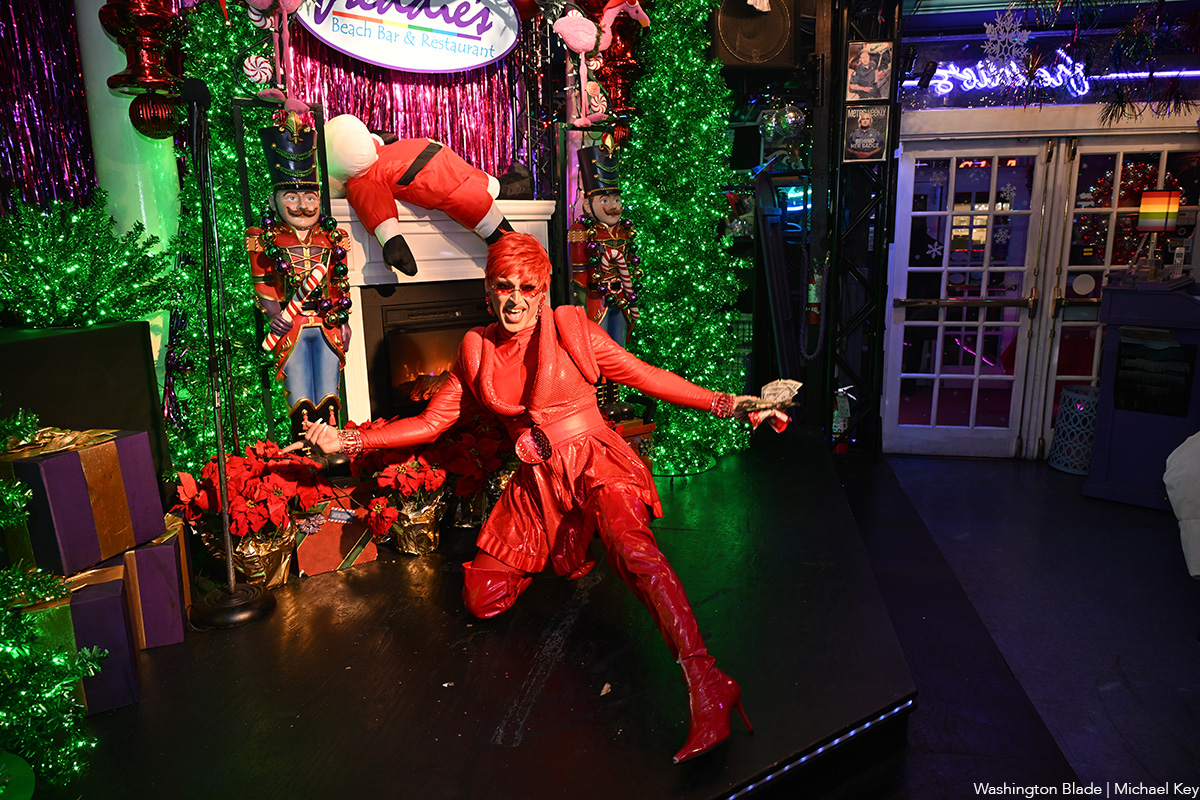
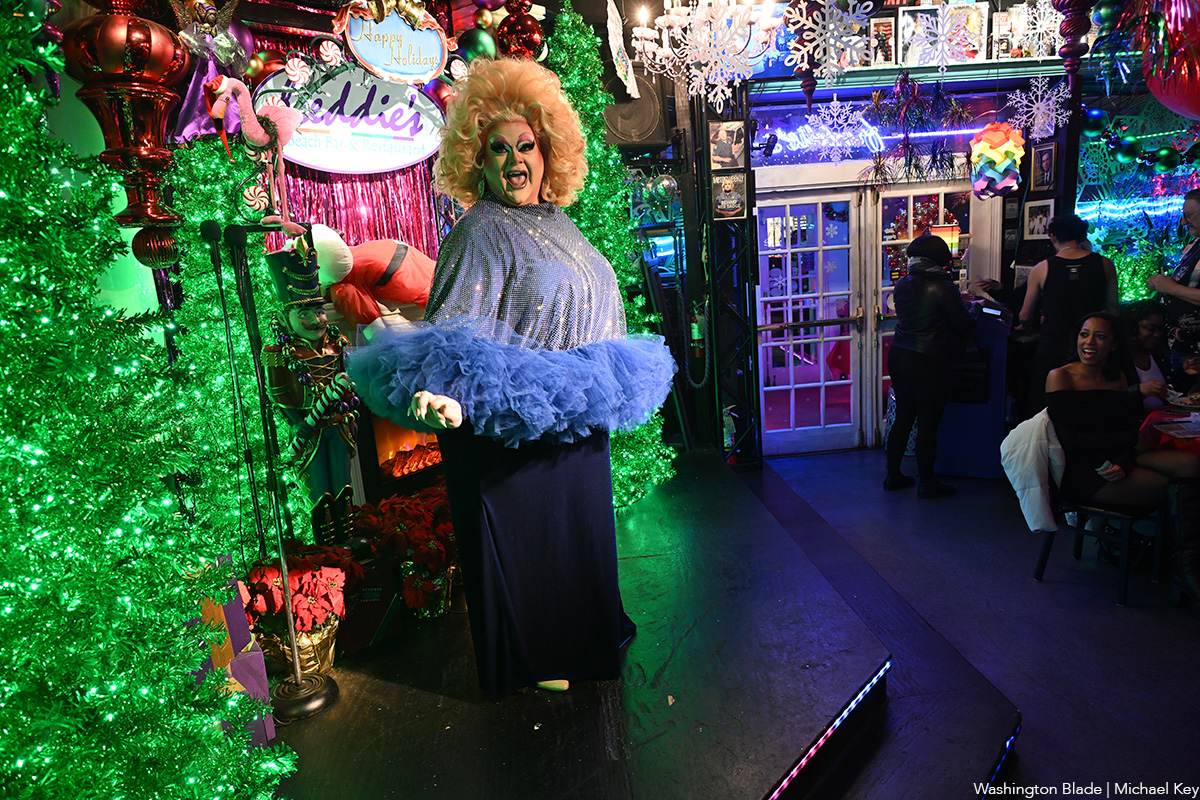
-

 Sponsored5 days ago
Sponsored5 days agoSafer Ways to Pay for Online Performances and Queer Events
-

 District of Columbia4 days ago
District of Columbia4 days agoTwo pioneering gay journalists to speak at Thursday event
-

 Colombia4 days ago
Colombia4 days agoBlade travels to Colombia after U.S. forces seize Maduro in Venezuela
-

 a&e features4 days ago
a&e features4 days agoQueer highlights of the 2026 Critics Choice Awards: Aunt Gladys, that ‘Heated Rivalry’ shoutout and more




















